
Lynn Werner worked at the chair as a scientific assistant. Her main fields of interest to this day are social science methods, both qualitative and quantitative. For her, this includes paying close attention to how data are produced and worked with, something she also focused on in her B.A.-thesis on the data practices around femicide in Germany. Working at this chair allowed her to further explore these interests. Lynn now works as a student assistant at the statistics office of the City of Dortmund in the areas of data analysis and visualisation as well as survey organisation.

Sandra Plontke studied German Literature, Social Psychology and Social Anthropology at the Ruhr-University of Bochum. After her master’s thesis on epistemological aspects of nonverbal communication in the work of Hugo von Hofmannsthal, she has been working as a lecturer at the University’s Institute of German Philology and later on at the Department of Social Psychology and Social Anthropology. In her doctoral thesis supervised by Jürgen Straub with the working title "Image Theory and Image Analysis: Cultural Psychological and Microsociological Perspectives", she is working on a synopsis, exploration and cultural psychological reflection of image hermeneutic approaches in (interpretative) psychology and qualitative social research with the aim of developing her own methodological approach to images on the basis of relational hermeneutics. In doing so, she pursues an integrative and interdisciplinary approach that attempts to combine approaches from art studies, art history and visual studies with cultural psychology.
Since 2017: Graduate Research Assistant at the Chair of Social Theory and Social Psychology and at the affiliated Hans Kilian and Lotte Köhler Centre for Social and Cultural Psychology and Historical Anthropology (KKC)
2017-2019: Coordinator of the "Forschendes Lernen3" project line at inSTUDIESplus
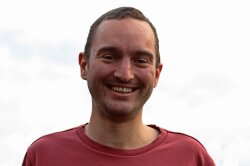
I'm interested in the digital transformation of society and the ways science and technology are part of it. In my point of view Science and Technology Studies can help make this process more transparent and therefore democratic. In my dissertation project with the working title "Protection against re-identification in the linkage of scientific data" i'm investigating the threats for privacy that emerged with the ongoing trend of growing personal data-driven research and how science is handling these.
2021 - 2023: PhD Program/NRW Fortschrittskolleg "SecHuman" – Security for people in cyberspace
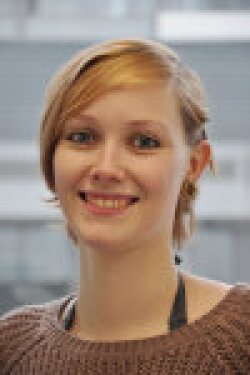
I am interested in matters of digital technology. Matter is both material (grids, energy, devices, servers, cables, heat, etc.) and an ethico-political concern (non/access, public/private, secure/insecure, etc.).
In my dissertation I conducted an ethnographic research of cybersecurity practices in two large German critical infrastructures. Cybersecurity is a matter of technology as it combines material-semiotic relations and ethico-political commitments and morality. I found cybersecurity to require a shift in thinking about human-technology relations from assuming inherent difference, heterogeneous networks, or constant adaptation, towards being characterised by precarity and fragility. The thesis then unfolds modes of dealing with these fragile relations: as a matter of care and preparedness rather than control and prevention. And finally the thesis points to some terms to think along the lines of fragility in cybersecurity research and STS/social anthropology.
Since July 2022: Postdoctoral Researcher at Aalborg University, Copenhagen
February 2022 - July 2022: Graduate Research Assistant at Aalborg University, Copenhagen
March 2021 - September 2021: Research Fellow at the Center for Advanced Internet Studies (CAIS)
November 2016 - April 2020: PhD Program/ NRW Fortschrittskolleg "SecHuman" – Security for people in cyberspace. Title of dissertation: “Big data - IT security in practice”
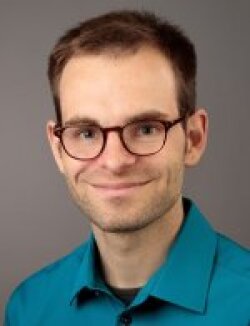
I am interested in the development of "algorithmic empathy" (Bajohr 2015) in the context of Affective Computing. Affective Computing is "computing that relates to, arises from, or deliberately influences emotions." (Picard 2000:3). Within this field, I focus on the development and application of automatic emotion recognition technologies and standards. In my empirical investigation, I use a praxiographic approach to analyse the involved chains of translation (Latour 1999) which transform formerly elusive phenomena (feeling, affect, emotion) into measurable objects which, in turn, become the foundation for a system's successive behaviour or re-actions. These computational processes of tracing a person‘s moods and feelings, and the automatic reaction to such measurements, are analysed in analogy to "empathy" in human-to-human interactions.
July 2017 - July 2020: Graduate Research Assistant and Doctoral Student, Ruhr University Bochum
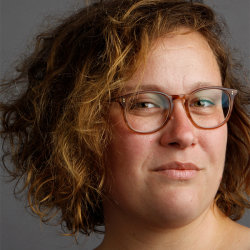
As a trained social anthropologist, I am working on the intersection between science and technology studies and health studies with a particular interest in participatory ethnographic methods and the sociomaterial (work) routines of health care. I research how (novel) technology is introduced into medical practice in various fields such as mental health or occupational (sleep) health. Currently, I am developing my habilitation project regarding participatory ethnographic methods and future imaginings in medical innovation.
Since August 2021: Postdoctoral Research Associate at Ruhr University Bochum, Faculty of Medicine, Institute for General Practice and Family Medicine
December 2019 - July 2021: DAAD PRIME Postdoctoral Fellow at the chair for Cultural Psychology of Knowledge, Faculty of Social Science, Ruhr University Bochum
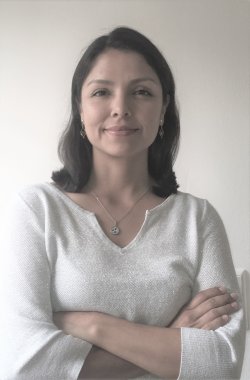
During my research work, I have a focus on the anthropology of development, posing my ethnographic attention in development projects and the relations between indigenous and peasant communities, the State, and multinational corporations. I have engaged in dialogue with political ecology, postcolonial theory and science and technology studies, to inquire for the power relations, the role of technologies and the production of knowledge in contexts of resource extraction. I am especially interested in indigenous social movements and their networks with international activism, and how in these we can observe the emergence of a post-extractivism thought that disrupts and entails potentials for change in our fossil-fueled global economy.
In my current research I am focusing on water governance in dryland rural regions. With the project "Mapping Waterscapes: hydric (in)justice in rural Colombia" in which I seek to explore how in heterogeneous water entanglements local participation in water governance can be supported for the wellbeing and sustainable development of local communities.
Link to Academia: https://rub.academia.edu/SusanaCarmona
Since October 2019: Assistant Professor, Faculty of Science and Engineering, University College Maastricht
December 2018 - September 2019: Research Associate at Ruhr-University Bochum
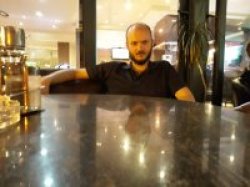
I started my academic life with a BA in sociology (major) and psychology (minor) at the University of Jena. There, I mostly dealt with issues surrounding the term "globalization" and very soon came to enjoy empirical research with qualitative methods. Inspired by a critical approach to analyse micro- and macro-social events, I joined the MA programme in sociology at the University of Frankfurt/Main, where I had the chance to gain greater expertise in qualitative research methods, especially ethnography, and found my way to the social studies of science and technology (STS) and environmental social sciences. I graduated with a MA thesis about experimental practices in an ecovillage and the ways in which nonhumans participate in the articulation of "sustainable living".
I am now working as a research associate at the Goethe-University Frankfurt while I stay team member of the RUSTlab Bochum: https://rustlab.ruhr-uni-bochum.de/
Since December 2019: Research Associate at Goethe-University Frankfurt
November 2018 - November 2019: Research Associate at Ruhr-University Bochum
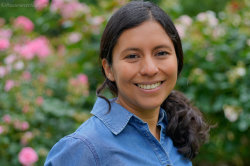
Abigail Nieves Delgado works as a researcher at the Centre for Anthropological Knowledge of Scientific and Technological Cultures (CAST), Ruhr University Bochum. She received her PhD from the National Autonomous University of Mexico (UNAM) in 2016 (thesis titled ‘The dominion of the face: A critical and historical analysis of the study of the human face’, Spanish title). Her research focuses on the history of physical anthropology and on the role of race in contemporary forensic sciences and biometric identification. Her current project “Collecting and Categorizing Faces for Security: Facial Recognition in the Era of Big Data” is funded by the Gerda Henkel Foundation. It investigates how societal threats influence technological development in biometrics. Besides this she is interested in daily security practices of internet users, and in the configurations of identity in human-computer interactions.
Since 2021: Assistant Professor, Freudenthal Institute, Utrecht University
2020: Postdoctoral Researcher, Wageningen University
2017 - 2020: Postdoctoral Researcher, Centre for Anthropological Knowledge in Scientific and Technological Cultures (CAST), Ruhr-University Bochum
June 2016 - December 2016: Visiting PhD Student and Postdoctoral Researcher (since 10/2016) of Mercator Research Group ‘Spaces of Anthropological Knowledge’, Ruhr-University Bochum
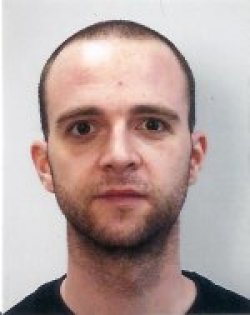
Jan Schank received his PhD from Ruhr-University Bochum in 2015, with a dissertation on the (textual) practices of knowing media harm in age-rating computer games, supervised by Estrid Sørensen at the Mercator Research Group “Spaces of Anthropological Knowledge”. He has also taught several classes at RUB’s department of social science and worked on political enquiries as well as the making and use of “political positions” by parliamentary groups. His main research areas are ethnomethodology and conversation analysis, studies of regulation practices, practice-based studies of texts, ethnography, and Science and Technology Studies.
Since 2014: Research Associate at the Albert-Ludwigs-University Freiburg
February 2015: PhD in Social Science, Ruhr University Bochum Dissertation: „W/wissen in der Alterskennzeichnung von Computerspielen – Eine praxeographische Analyse ausgewählter Entscheidungstexte aus dem Freigabeverfahren bei der Unterhaltungssoftware-Selbkontrolle (USK)“ [„Knowledge and Knowing in Age-Rating Computer Games – A Praxeographic Analysis of Selected Written Decisions from the Rating Procedure at the Entertainment Software Self-Control Agency (USK)“] Supervisor: Estrid Sørensen
January 2011 – February 2015: PhD student in Social Science at Mercator Research Group „Spaces of Anthropological Knowledge“, Ruhr University Bochum (Supervisor: Estrid Sørensen)
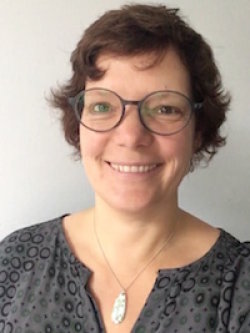
Josefine Raasch received her PhD from Swinburne University in Melbourne, Australia, with a dissertation on teenagers’ enactment of historical knowledge in a classroom. She worked at the Ruhr-University from August 2013 till January 2019 as research fellow, project manager and for a year as lecturer. At the CUPAK, she has worked on practices through which children are documented and on knowing, doing and managing differences in democracies, both within the knowledge traditions of Science and Technology Studies. In her ethnographic analysis, situations are central as well as the relations through which her research objects come into being.
Since 2019: Learning Designer for Executive Education at the ESMT Berlin
2013 - 2019: Research Fellow/Lecturer/Project Coordinator at Ruhr-University Bochum, Mercator Research Group ‘Spaces of Anthropological Knowledge’ and ‘Centre for Anthropological Knowledge in Scientific and Technological Cultures’